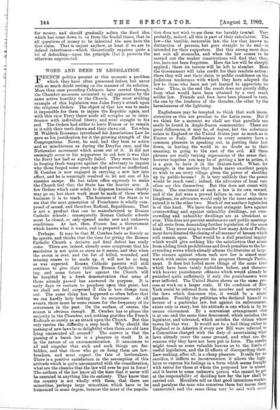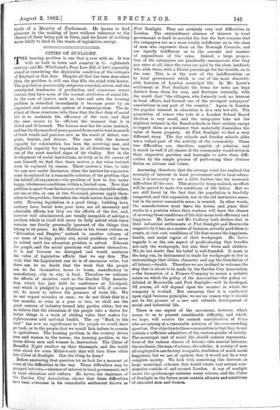WORD AND DEED IN LEGISLATION.
FRENCH politics present at this moment a problem which they have often presented before, but never with so much doubt resting on the manner of its solution. More than once preceding Cabinets have carried through the Chamber measures animated to all appearance by the same active hostility to the Church. The most striking example of this legislation was Jules Ferry's attack upon the religious Orders. The object of that law was to make it impossible for them to injure the Republic again, and. with this view Ferry threw aside all scruples as to inter- ference with individual liberty, and went straight to his end. The Orders had either to leave France or to remain in it with their teeth drawn and their claws cut. Yet when M. Waldeck-Rousseau introduced his Associations Law he gave as his justification for it the growing strength of the Congregations. Never, he said, had they been so active and so mischievous as during the Dreyfus case, and the Nationalist movement which arose out of it. It did not seemingly occur to his supporters to ask how it was that the Ferry law had so signally failed. They were too busy in forging fresh weapons against the adversary to inquire why those forged some years ago had proved so ineffectual. M. Combes is now engaged in carrying a new law into effect, and he is seemingly resolved to let not one of his enemies escape. He has taken office expressly to make the Church feel that the State has the heavier arm. A few Orders which exist solely to dispense harmless charity may go on, but short work must be made of those whose business it is to teach. The business of the State is to see that the next generation of Frenchmen is wholly com- posed of sound, and therefore Radical, Republicans. That is not a product that can be manufactured in Roman Catholic schools ; consequently Roman Catholic schools must be closed, or only opened under new and. unknown conditions. At last, then, France has a Government which knows what it wants, and is prepared to get it.
Perhaps. It may be that M. Combes feels as fiercely as he speaks, and thinks that the time for giving the Roman Catholic Church a decisive and final defeat has really come. There are, indeed, already some symptoms that his resolution is not quite as stern as it seems, and that when the storm is over, and the list of killed, wounded, and missing comes to be made up, it will not be so long as was expected. Roman Catholic parents will still continue to give their children Roman Catholic teach- ing, and some future law against the Church will be heralded by a fresh demonstration that none of those already passed has answered its purpose. It is early days to venture to prophesy upon this point, but we shall not feel surprised if this is how things turn out. The same thing has happened so often before that we can hardly help looking for its recurrence. At all events, there must be some reason for the frequency of its occurrence in the past. On the surface, of course, the reason is obvious enough. M. Combes has to please the majority in the Chamber, and nothing gratifies the French Radicals so surely as an attack upon the Church. But this only carries the difficulty a step back. Why should the passing of new laws be so delightful when there are old laws lying unexecuted all around ? The answer is that the passing of a harsh law is a pleasure in itself. It is in the nature of an excommunication. It announces to all and singular that such and such things are for- bidden, and that those who go on doing them are law- breakers, and must expect the fate of lawbreakers. There is a positive satisfaction in the assumption of this attitude which is quite unconnected with the consideration, what are the chances that the law will ever be put in force? The authors of the law know all the time that it never will be executed in anything like its entirety. They know that the country is not wholly with them, that there are minorities, perhaps large minorities, which have to be humoured in some degree, because the mass of the popula- tion does not wish to see them too harshly treated. Very probably, indeed, all this is part of their calculation. The- law—the terrible, inexorable law, the law that knows no distinction of persons, but goes straight to its end—is intended for their supporters. But this strong meat does not suit all stomachs, and when the law comes to be carried out the weaker constitutions will find that they, too, have not been forgotten. Here the law will be sharply applied ; there its terrors will be left to slumber. Here the Government will take credit for their resolute action ; there they will rest their claim to public confidence on the judicious tenderness with which they have adapted the law to those who have not yet learned to appreciate its value. Thus, in the end the result does not greatly differ from what would have been attained by a very much milder law. Friends and foes have been pleased in turn, the one by the loudness of the thunder, the other by the harmlessness of the lightning.
Englishmen may be tempted to think that such incon- sistencies as this are peculiar to the Latin races. But if we think for a moment we shall see that parallels can easily be found in Anglo-Saxon communities. There are great differences, it may be, of degree, but the substance exists in England or the United States just as much as in France or Italy. Enthusiasts in every country have a common pleasure in speaking out, in putting their foot down, in leaving the world in no doubt as to their meaning, in going to the root of the evil. All these phrases are really varying expressions of the sense that, however hopeless you may be of getting a law in action, it is a gain to have it in the Statute-book. What, for example, is the motive that leads many excellent people to wish to see every village given the power of shutting up its public-houses ? It is very unlikely that the power would be much used ; indeed, the advocates of local veto often say this themselves. But this does not count with them. The enactment of such a law is its own reward, and if the Act were a proved failure in one of the three kingdoms, its advocates would only be the more anxious to extend it to the other two. Much of our sanitary legislation is of this kind. We have the most stringent laws against overcrowding and against unhealthy dwellings, yet over- crowding and unhealthy dwellings are as abundant as ever. This does not prevent conferences and public meetings of all sorts from demanding further legislation of the same kind. They never stop to consider how many Acts of Parlia- ment have directed the closing of all manner of houses which still remain open. That would be a dull practical inquiry which would give nothing like the satisfaction that arises from adding fresh prohibitions and fresh penalties to the far- extending series which already adorns the Statutes at large. The sinners against whom each new law is aimed must watch with entire composure its progress through Parlia- ment. It does but forbid more things of the same kind which have been vainly forbidden before, and threaten with heavier punishment offences which would already be punished quite sufficiently if only the punishments were ever inflicted. The United States shows us the same pro- cess at work on a larger scale. If the condition of New York could be inferred from the number and severity of the laws which denounce vice, it would be a moral paradise. Possibly the politician who declared himself in favour of a particular law, but against its enforcement, exists only in story, but his attitude is one which is by no means uncommon. By a convenient arrangement vice is at one and the same time denounced, which satisfies the legislator, and tolerated, which satisfies the citizen whose tastes lie that way. It would not be a bad. thing either in England or in America if every new Bill were referred to a Committee charged with the duty of ascertaining what laws already cover the same ground, and what are the reasons why they have not been put in force. The results might teach us some valuable lessons as to the limits of useful legislation, and. the ill effects of disregarding them. Law-making after all, is a cheap pleasure. It calls for no sacrifice, it inflicts no inconvenience, it allows the legis- lator to express his feelings in a form which seems fraught with terror for those at whom the proposed law is 'aimed, and it leaves to some unknown person who cannot be got at the responsibility of deciding how far the law shall be carried out. Moralists tell us that good intentions weaken and paralyse the man who conceives them but leaves them unexecuted. and the same thing may be said with equal truth of a Member of Parliament. He learns to find pleasure in the making of laws without reference to the chance of their being put in force, and we know of nothing more likely to lead to the waste of legislative energy.







































 Previous page
Previous page